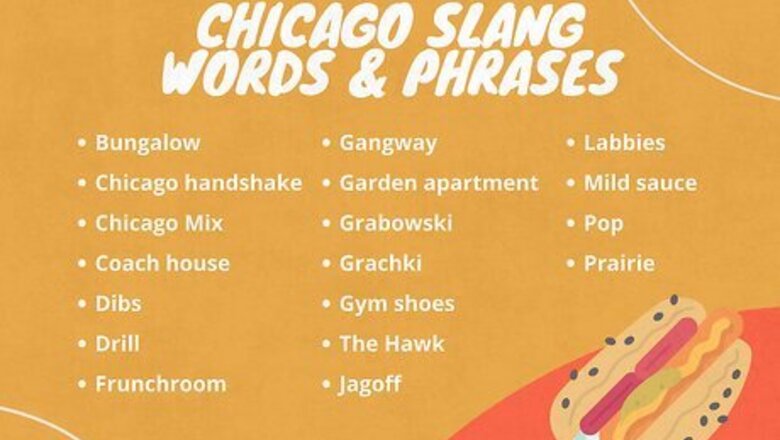
views
Chicago Slang Words & Phrases
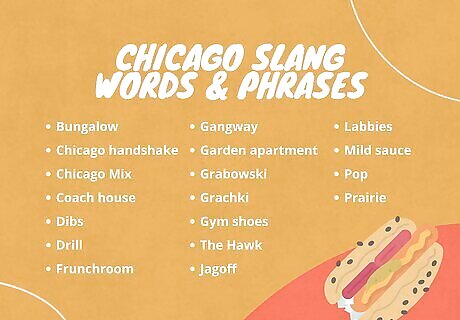
BungalowA bungalow (noun) is a one-story, single-family home with a slanted roof. It’s a very common type of home found in working-class neighborhoods all around Chicago. Similarly, “bungalow belt” refers to the socially conservative, historically white neighborhoods in the Northwest and Southwest sides of the city.
Chicago handshakeA Chicago handshake (noun) isn’t some secret handshake that only people from the city know about—it’s a local drink trend! Specifically, “Chicago handshake” typically refers to a shot of Jeppson’s Malört (a very bitter, strong spirit) followed by a pint or can of Old Style beer (which is popular in the Midwest).
Chicago Mix“Chicago Mix” (noun) refers to a popular Chicago snack—a combination of cheddar and caramel-flavored popcorn. It’s a Chicago staple, so most popcorn shops around the city sell this salty-sweet treat!
Coach houseA “coach house” (noun) is a small apartment situated in the back of a property—basically a backyard house. However, these are considered old-fashioned and fairly rare in present-day Chicago, since the construction of new backyard houses goes against the city’s zoning ordinance.
DibsLots of people beyond the borders of Chicago call “dibs,” but it has a very specific use in the Windy City. Chicago is known for having heavy snowfall in winter, and when it snows, people dig out parking spots on the street and call “dibs” on them using random objects—from cinder blocks to lawn furniture, tires, or any junk lying around the house. It’s a winter tradition!
DrillDrill (noun) is a type of music—a subgenre of rap originating from Chicago’s South Side in the 2010s. Drill lyricism is typically very dark and confrontational, focusing on subjects like gang rivalries and violence, street life, and other conflicts that drill rappers experience in their lives. Chicago rappers such as Chief Keef, Lil Durk, Lil Reese, G Herbo, and King Louie are all early examples of successful drill rappers.
FrunchroomThis silly-sounding slang term refers to the front room of any apartment, bungalow, or house—traditionally the room used to entertain guests, and therefore with all the best furniture inside. In Chicago, the frunchroom (noun) is usually the room that overlooks the street.
GangwayA gangway (noun) is a narrow sidewalk running between two houses or buildings. These sidewalks are called “gangways” because, back in the heyday of Chicago’s notorious organized crime, gang members were said to use these narrow passages to evade the police.
Garden apartmentIn Chicago, realtors use the term “garden apartment” (noun) to describe a basement apartment (or any unit that’s partially below street level). “Garden apartment” makes the place sound a little more appealing to potential renters.
Grabowski“Grabowski” (noun) is a term for any blue-collar worker—people who are tough and hardworking. This term was popularized by Chicago Bears coach Mike Ditka, who called his players “Grabowskis.” That, in turn, was a reference to a former running back for the Chicago Bears, Jim Grabowski.
Grachki“Grachki” (noun) is actually a Chicago-style mashup of two words; it’s slang for “garage key.” So, if you hear a Chicagoan asking for the “grachki,” they’re really looking for their garage key!
Gym shoesGym shoes (noun) is just a slang term for sneakers, or any type of athletic shoes. If you heard one Chicagoan asking another what kind of sneakers they bought, it’d probably be phrased something like, “What gym shoes did you get?”
The HawkThe Hawk (noun) is a term for the cold winds coming off of Lake Michigan. It comes from AAVE (African American Vernacular English) and was popularized by R&B singer Lou Rauls’ 1967 song “Dead End Street,” which contains the lyrics, “The Hawk, the almighty Hawk, the wind …in Chicago, the Hawk not only socks it to you, he socks it through you, like a giant razor blade blowing down the street.”
JagoffA “jagoff” (noun) is a classic insult used to describe anyone particularly loathsome by Chicagoan standards, from corrupt politicians to bad drivers. Basically, anyone you don’t like could potentially be called a jagoff!
Labbies “Labbies” (noun) is a slang term for students at the University of Chicago Laboratory School. It’s a private primary school (pre-school and K-12) affiliated with the University of Chicago, attended by kids from many of the city’s wealthy and affluent families.
Mild sauce“Mild sauce” (noun) refers to a common Chicagoan mash-up of ketchup, hot sauce, and barbecue sauce. It’s often served with fried chicken, and thus, it’s a mainstay on the menus of many Chicago fried chicken eateries—including Harold’s Chicken Shack or Unle Remus Saucy Fried Chicken.
PopOther people might say, “I’ll have a Coke,” or “I want some soda,” but in Chicago, they say “I want some pop” instead. Pop (noun) is a Midwestern slang term for any type of soda, and a shortened form of the term “soda pop.” Although it’s popular all around the Midwest, it’d be impossible to make a list of Chicago slang without including “pop” as well.
PrairieNo, there aren’t any actual prairies in Chicago. Rather, a prairie (noun) is a vacant lot in any Chicago neighborhood—sometimes covered in weeds because it’s so utterly deserted. For instance, you might hear a Chicagoan talk about neighborhood kids playing in the “prairie,” describing the way kids play in a nearby vacant lot.
ShowShow (noun) simply refers to the movies! Instead of saying “I’m going to the movies,” a Chicago native might say, “I’m going to the show” instead.
SlashieA “slashie” (noun) is a bar that not only serves beer and liquor, but sells it to go as well—basically, a cross between a bar and a liquor store. Some slashies consist of a bar with an attached liquor store, while others are bars that have coolers and shelves inside where you can buy liquor to go.
Steppin’The “Steppin’” or “Stepping” dance (noun) is a type of partnered dance that originated in Chicago—specifically, within its urban community on the South and West sides. Since its creation, Chicago-Style Stepping has spread to other areas of the U.S. and even overseas! It was originally called “Bopping.”
The Taste“The Taste” (noun) refers to the Taste of Chicago, a famous food festival hosted in Chicago every July. So, if you hear a Chicagoan say they’re going to “the Taste,” that means they plan on gorging themselves on amazing food at the city’s renowned food festival!
Two-flatA “two-flat” (noun) is a type of two-story apartment building, common in many Chicago neighborhoods. In a two-flat, one tenant lives on the first floor, and the other tenant lives on the second. And, if there’s a garden apartment, a third tenant might live there! Similarly, three-flats and four-flats are three and four-story apartment buildings with one tenant per floor.
Washroom “Washroom” (noun) is a Chicago slang term for the bathroom, or the restroom. It’s common to hear someone from Chicago ask for the “washroom,” or tell you they’re going to the “washroom” rather than the bathroom. And, if you need a bathroom, you could ask someone where the nearest washroom is to find one!
Wet“Wet” (adjective) doesn’t describe being covered in water on a rainy day in Chicago—it describes an Italian beef sandwich with a very generous amount of gravy poured on top. Ordering your Italian beef “wet” is definitely a Chicago tradition, so give it a try if you want to live like a local!
YuppieYuppie (noun) is slang for a young urban professional, and though it’s not exclusive to Chicago, it does originate there! That’s because the term “yuppie” was first used in print in Chicago Magazine, in an article written by Dan Rottenberg in 1980. So, Chicago gets to claim that particular word.
16-inchThe “16-inch” (noun) is a type of bigger, slow-pitch softball that’s totally unique to Chicago. It took off during the Great Depression era, growing popular because it could be caught barehanded by players who couldn’t afford gloves, and it didn’t travel as far as a standard 12-inch softball (which was convenient for playing in smaller, urban parks).
Chicago Slang for Locations Around the City
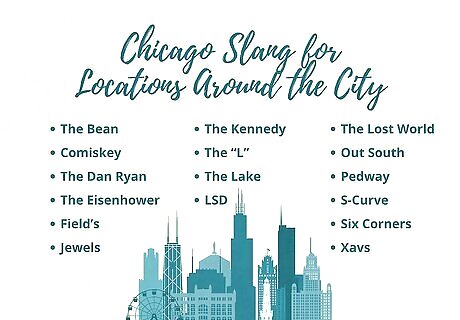
The BeanWhile the name of Chicago’s most famous sculpture is officially the “Cloud Gate,” that’s not what Chicagoans call it. No, Millennium Park’s iconic sculpture has been affectionately nicknamed “the Bean,” because…well, that’s exactly what it looks like. It’s an enormous, bean-shaped sculpture with a shiny, mirror-like surface; visitors often take funny, distorted photos in the Bean’s surface. So, if you need directions, don’t ask a Chicago native how to get to the Cloud Gate. Say, “How do I get to the Bean?” They’ll know exactly what you mean!
ComiskeyComiskey Park was the name of the White Sox’s old home field that was demolished in 1990. The new ballpark built in its place was renamed the U.S. Cellular Field in 2003—then, later, renamed again to the Guaranteed Rate Field. However, diehard Sox fans still refer to it as “Comiskey” in honor of the original name!
The Dan Ryan“The Dan Ryan” refers to a section of the I-94 and I-90 highways, stretching from the Jane Byrne Interchange to 95th Street. This section of the highway is named after former Cook County Board president Dan Ryan Jr.; thus, Chicagoans call it “the Dan Ryan.”
The EisenhowerYes, this is another stretch of highway in Chicago—specifically, the section named after U.S. President Dwight D. Eisenhower. The name refers to a section of the I-290 stretching from the Jane Byrne Interchange to Schaumburg, one of Chicago’s suburbs. You might also hear Chicagoans call it “the Ike” (a nickname for “Dwight”).
Field’s “Field’s” is actually a slang term for Macy’s—but, because the Macy’s store on State Street was originally Marshall Field’s, a Chicago-born department store later acquired by Macy’s, Chicago natives still call it “Field’s” (out of habit or stubbornness).In the same vein, Willis Tower is still referred to as the “Sears Tower” in Chicago, even though it hasn’t had that name in years!
JewelsJewel Osco is a super popular grocery store chain in Chicago—but that’s a bit of a mouthful, so Chicagoans just say they’re going shopping at “Jewels” instead—removing the “Osco” and adding an “s.” Basically, going to “Jewels” just means someone is going grocery shopping!
The KennedyThe Kennedy is a section of the I-94 and I-90 highway that stretches from the Jane Byrne Interchange to the O’Hare International Airport in Chicago. It’s named after U.S. President John F. Kennedy, hence the nickname “the Kennedy.”
The “L”The “L” is a blanket term for the Chicago train system; this includes all train lines, both above and below ground. The term itself is short for “elevated,” even though it now describes even the train lines that aren’t elevated.
The LakeThe Lake is just a quick, slang name for Lake Michigan—one of the U.S.’s Great Lakes, and the lake bordering Chicago; in fact, Chicago is situated along roughly 22 miles of Lake Michigan’s coast. Many neighborhoods in the city have a fabulous view of Lake Michigan, so it’s no wonder you’ll hear Chicago natives mention “the Lake” here and there!
LSDDon’t worry, Chicagoans aren’t universal fans of the psychedelic drug LSD. In Chicago, “LSD” is short for “Lake Shore Drive,” a major roadway in the city that runs along the shores of Lake Michigan. LSD is known for its pretty views and great architecture; some tourists go driving along Lake Shore Drive just to see the sights.
The Lost World“The Lost World” refers to Lower Wacker Drive—an underground two-level roadway that goes through the Loop, running along the Chicago River. It’s designed to reduce traffic on the city’s roads, and due to its unusual, subterranean nature, Chicago residents call it “the Lost World.”
Out South“Out South” simply refers to Chicago’s South Side and south suburbs. So, when asked where in Chicago they’re staying, a person staying on the South Side might answer, “Out South.”
PedwayThe Pedway is a network of underground passageways and overhead bridges dedicated for pedestrian use in the Loop, which is a very busy, metropolitan area of the city. During cold winters, the Pedway makes traveling from building to building much easier! It covers around 5 miles and links more than 40 blocks in the city.
S-Curve“S-curve” refers to a series of sharp, S-shaped 90-degree turns on Lake Shore Drive that were infamous for causing bottlenecks and traffic jams back in the day. By the 1980s, these sharp S-curves were replaced with much gentler turns—so this modern-day section of Lake Shore Drive is much less difficult to drive.
Six Corners“Six Corners” is a well-known three-street intersection in the Portage Park neighborhood of Chicago. It’s the point where Irving Park Road, Cicero Avenue, and Milwaukee Avenue meet, and it’s also a very popular spot for retail and shopping. Six Corners isn’t the only three-street intersection in the city, however; there’s also one between North Avenue, Damen Avenue, and Milwaukee Avenue in Wicker Park.
The StevensonThe Stevenson is a section of highway (the I-55, specifically) in Cook County that stretches from Chicago all the way down to St. Louis, Missouri. St. Louis is located very close to Missouri’s shared border with Illinois.
Xavs“Xavs” is short for St. Xavier University, a private Catholic university in Chicago. It’s located on the Southwest Side of the city, and is Chicago’s oldest college (founded by the Sisters of Mercy in 1846).
Chicago Slang Sayings
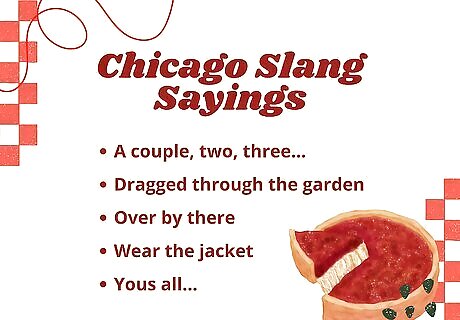
A couple, two, three…Some people say “a few,” but in Chicago, they say, “A couple, two, three” instead. Funnily enough, this slang saying actually elongates a phrase instead of shortening it! So, if you were splitting a traditional Chicago deep dish with some friends and wanted seconds, a friend might say there’s “a couple, two, three slices” to indicate that there’s a little more pizza left you could claim.
Dragged through the garden“Dragged through the garden” is a saying you’ll hear when ordering a Chicago-style hot dog. It means you want all the usual toppings: yellow mustard, chopped onions, neon green sweet-pickle relish, sliced tomato, sport peppers, a dill pickle spear, and a sprinkling of celery salt. Hint: do not ask for ketchup. You won’t find it anywhere near a Chicago-style hot dog!
Over by thereHere’s another example of Chicago slang that makes a phrase longer instead of shortening it! “Over by there” is the Chicagoan way of saying “over there,” or describing a location where something happened. So, if someone was describing their visit to Chicago’s Shedd Aquarium, they might point in the aquarium’s direction and say, “I went to Shedd, over by there.”
Wear the jacketSomeone who “wears the jacket” is basically taking the fall or blame for something. It usually applies to underlings who take the blame for a boss’s scandal; for instance, an old headline from the Chicago Sun-Times once read, “Does Daley Ever Wear the Jacket?” (referring to Chicago’s then-mayor, Richard J. Daley, who often shifted blame for scandals or problems to his underlings).
Yous all…Instead of saying “you all,” a Chicagoan might say “yous all” instead, making the word “you” plural. For instance, you might hear a Chicago native offer their friends popcorn and say, “Yous all want some Chicago Mix?”
Chicago Accent & Pronunciation Advice
“Th” sounds are often replaced with “d” instead. The stereotypical Chicago accent lacks a lot of “th” sounds; words like “these,” “them,” and “those” are pronounced “dese,” “dem,” and “dose.” Even “the” is pronounced “da” instead. So, if you’re trying to imitate the Chicago accent, drop the “th” and replace it with “d” when you’re talking about visiting da Bean or your view of da Lake. You can also drop the “h” in words like “three”—so when you’re saying, “A couple, two, three,” it’d sound like “A couple, two, tree.” The lack of a “th” in the Chicago accent probably comes from European immigrants who spoke languages without “th” sounds, making them hard to pronounce in English. Keep in mind, you probably won’t hear young people in Chicago speak with this accent; it’s mostly used by older generations.














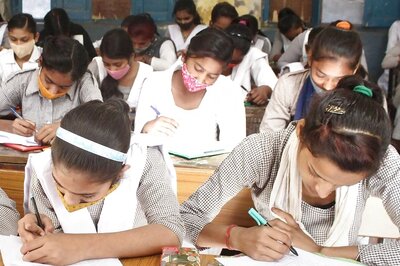



Comments
0 comment